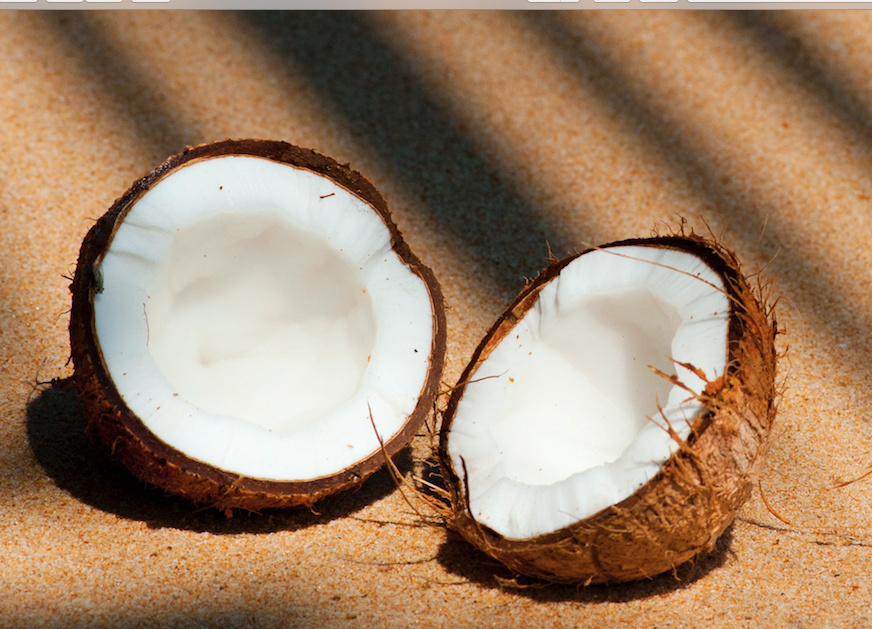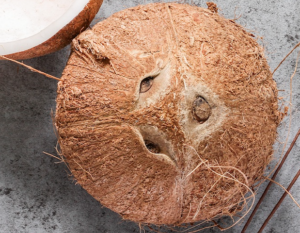
Seems everywhere you look these days someone is touting the benefits of coconut oil for healthy and for beauty. But wasn’t it just a few years ago that headlines and conventional health professionals were warning us against the negative effects of ‘tropical oils’? What to believe?
Here are some facts to help you understand why you should include this beneficial oil in your diet every day:
First a little background
 Early Spanish explorers discovered this fun fruit (yes, despite its name it is not a nut) during their Caribbean travels and called it coco which means ‘monkey face’.
Early Spanish explorers discovered this fun fruit (yes, despite its name it is not a nut) during their Caribbean travels and called it coco which means ‘monkey face’.
This is because with its three indentations, it resembles the head and sweet face of one of those little simians.
A multi-use food, the flesh, the water or milk and the oil squeezed from the flesh are all versatile and healthful and can be consumed or used as external health or body products. But the real buzz is about the oil.
Saturated fats healthy?
Coconut oil has been described as the healthiest oil on earth. The difference between it an all other oils lies in its fat molecule. It is indeed a saturated fat (which have gotten a bad, albeit misinformed reputation) but it is a medium chain fatty acid (MCFA) versus a short chain fatty acid which is what comprises animal fats and have different effects on the body. (Just FYI, oils that come from plants, specifically seeds, nuts and grains – like olives, sunflower, grapeseed, flax etc – are long chain fatty acids and also have certain beneficial properties).
Our bodies metabolize and respond differently to fats that are made up of the various sizes of fatty acid chains. What is awesome about MCFAs is they are quickly metabolized and absorbed straight into the liver where they are transformed into cellular energy for use. This offers multiple benefits:
- You get quick-acting, sustainable energy that burns a lot like carbohydrate but since it bypasses any pancreatic action, you avoid the impact on insulin so no spike and crash action.
- It has thermogenic effects so it helps to burn fat – not muscle – if your goal is to lose weight
- 40% of coconut oil is made up of lauric acid which has a cardio-protective power. Lauric acid assists the body in reducing LDL, the so-called bad cholesterol, and raising HDL, the beneficial cholesterol
- Coconut oil also contains a good quantity of acrylic acid which is a known natural anti-fungal and anti-bacterial compound.
How to Choose the Best Coconut Oil
Like any fats, when you choose coconut oil be certain to avoid products that have been hydrogenated or refined. Hydrogenation is a chemical process that manufacturers claim will ‘stabilize’ plant-based oils and give them a longer shelf life and the capacity to withstand a higher heat for cooking. Hydrogen is compressed into oil molecules but the resulting fats are then also bleached and adulterated via other chemical processes until what comes out at the other end bears no resemblance to the pure oils that go in. Think margarine. Blech.
There are hydrogenated, often also advertised as refined, coconut oils on the market too – avoid them! They are no better than margarine. In fact, it was hydrogenated coconut oils that were studied decades ago and caused scientists to proclaim tropical oils a health hazard. No wonder – they are chock full of chemicals and have been so manipulated that the body cannot recognize them as real food.
Virgin or extra virgin coconut oil on the other hand has not been through this process. Like virgin olive oil, it is cold expeller pressed meaning it is not heated, nor does it have anything added to it and so its health benefits are preserved. How is it made? The fresh raw flesh of the coconut is simply pressed through an expeller to extract the oils.
Truly raw, unrefined coconut oil will have a very mild flavour. It will also be solid at room temperature (because of the MCTAs) but if the temperature in your kitchen rises in the summer like it does in mine, your coconut oil will definitely liquefy. It is still perfectly fine to use and there is no need to refrigerate it.
How to Use Coconut Oil Every Day
I recommend that clients use a variety of beneficial oils in their diet each day so they get the benefits of all types of nutrients included in the various fats. Usually 3-4 tablespoons in total (which includes fats in foods like avocado, lean meats, dairy etc) is a healthy total amount for most people.
I am definitely a fan of coconut oil for most clients because of its versatility:
- Coconut oil can be used as a 1:1 butter substitute for sautéing or for baking or to just spread on bread or crackers.
- Add a tablespoon to your smoothies, oatmeal or yogurt for added energy and nutrition. Some people also enjoy it stirred into a hot beverage like herbal tea,
- A fast spoonful pre-workout can help fuel your energy stores in an easily digestible manner.
- Use it as a moisturizer for dry skin or lips – it will add a layer of protection from germs as well since it has anti-bacterial properties.
- Mix it half and half with coarse sea salt and use in the shower as an effective exfolliator.
- Swish a tablespoon in your mouth for 5-10 minutes each morning to destroy bacteria and help pull toxins from your gums and tissues. This ancient Ayruvedic practice is known as oil pulling.
